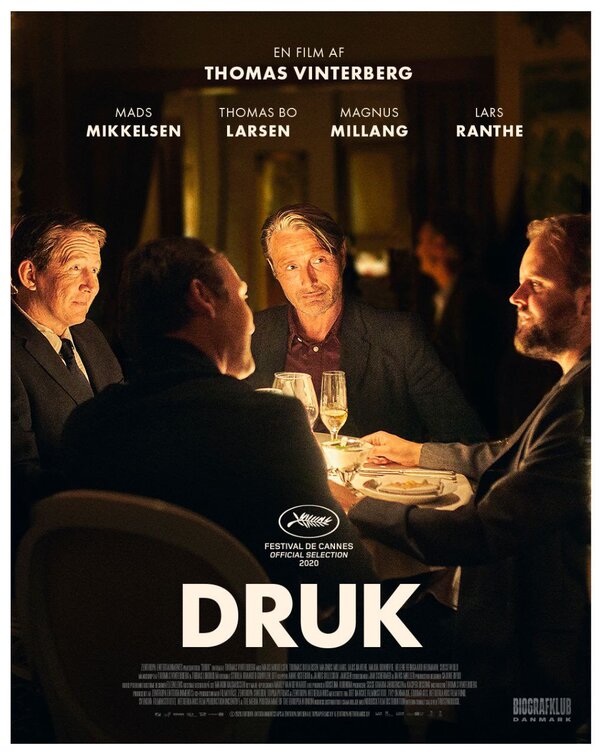Drink Up
Director
Thomas Vinterberg
Starring
Mads Mikkelsen
Thomas Bo Larsen
Magnus Millang
Lars Ranthe
Following a conversation about the benefits of operating with a specific steady amount of alcohol in your system, four teachers Martin [Mikkelsen], Peter [Ranthe], Tommy [Larsen] and Nikolaj [Millang], embark on an experiment to secretly do just that. To their elation, they feel more vibrant and energetic than ever before but soon enough their secret indulgence becomes a problem and edges closer to addiction.
From the outset, the framing of teachers facing a midlife malaise, surrounded by unengaged kids enjoying their lives, is clear. There’s a simple contrast between the opening scene illustrating the uproarious hijinks of the teenage students playing a game which requires them to run around a nearby lake, downing bottles of beer along the way and the flat, dim pastels of the classroom headed by frankly dull older men. This parallel never really leaves the story because the longer the experiment goes on, the more childish these supposed adults become, toying with pseudoscience to justify a petulant defiance. There’s an amusing rationalisation based on this notion put forth by Norwegian psychiatrist Finn Skårderud, with the group going so far as to set out a trial manifesto, imbuing their study with an official air, drawing up clear rules such as no drinking after 8pm or at weekends and buying breathalysers to maintain the desired 0.5 level. This is largely based on the anecdotal evidence of a handful of individuals who performed great feats despite being seemingly constantly intoxicated – Churchill, Hemmingway, Heerfordt, etc – but this direct causality is a clear falsehood.
The group dynamic is magnificent with each pillar acting as much as a supportive strut as a point of peer pressure. This is aided infinitely because each character is individually rounded and relatable and more importantly, charming. Having said that, at times it’s framed as an endearing friendship, other times there’s a sense that these bloated older men are rather pathetic and immature. A fantastic example of this is the third part of their experiment which looks at pushing the theory to its maximum, leading to the four men, painfully drunk, collapsing in supermarkets, haphazardly fishing on a pier by chucking rods into the sea then obnoxiously taking over a local bar before staggering off into the night. The social cohesion and support of the group lifts Martin’s spirits but in a prime example of post hoc ergo propter hoc, the teachers chalk this up to the alcohol, not being open with each other.
Thanks to Vinterberg’s ability to shine a light on tight-knit groups, Another Round is a rather thought-provoking analysis of drink culture, the social pressures to drink as well as the camaraderie that goes hand in hand with with imbibing. While it also offers a fleeting exploration of the rituals surrounding drink, it never truly delves into a pure damnation of alcohol, more about its ability to corrupt, the film offers a talking point about excess and moderation. Serving as a reminder that booze is not a substitute for happiness, that these men already had problems and the drinking wasn’t the direct cause, merely the catalyst that brought these feelings to the surface.
What makes the story initially engaging is the clinical aspect to it, the playful armchair philosopher. It’s something that was front and centre in Lars Von Trier’s Idioterne, pitching these men not as desperate old men but four worldly scholars set out to better themselves through unorthodox methods. Early in the experiment, Martin is off his chair, he’s engaging the students, challenging them, charming them and one of the most universally important requirements of life is a good teacher and Martin clearly believes the alcohol allows him to do this. But unlike other works covering social experiments, say Kinsey, Another Round never really explores the depths of depravity. It acknowledges that this is a supremely selfish endeavour and the leads’ lack of separation from their normal lives means the results cannot be purely academic but it fails to fully explore consequence, even though the movie directly deals with death.
As a character study, Another Round is well performed and very entertaining but I’m not entirely sure if it’s supposed to be a neutral statement about alcohol, an outright approval due to the inevitability of humans drinking or a stark criticism. In a way, much like the central characters, there’s no real outlined conclusion to thesis so it seems largely up to the audience to continue the conversation.
Release Date:
20 November 2020
The Scene To Look Out For:
To the film’s detriment, the world is never really explored outside of the core unit. At one point, Peter encounters a morose student, desperate to get into medical school and unable to cope with the general pressures of school life. Not operating to the fullest of his faculties and a little emotional that he never had a child of his own, Peter bluntly suggests the student take a shot before his exam to take the edge off. In terms of writing, this should setup a dilemma – a bit of a Chekhov’s gun – but there’s no real fallout, the film never has any form of ramification for this frankly crazy act. Which is a shame.
Notable Characters:
Mikkelsen has always been an amazing talent but it seems his work with Vinterberg produces his finest performances. Martin’s lethargic displacement erupting into peak emotional outbursts, both positive and negative, is deep, nuanced and spellbinding.
Highlighted Quote:
“I miss you too”
In A Few Words:
“A wonderful if ever so slightly toothless study”
Total Score: 4/5
![The Red Right Hand Movie Reviews [Matthew Stogdon]](https://reviews.theredrighthand.co.uk/wp-content/uploads/2021/12/cropped-header1.png)




